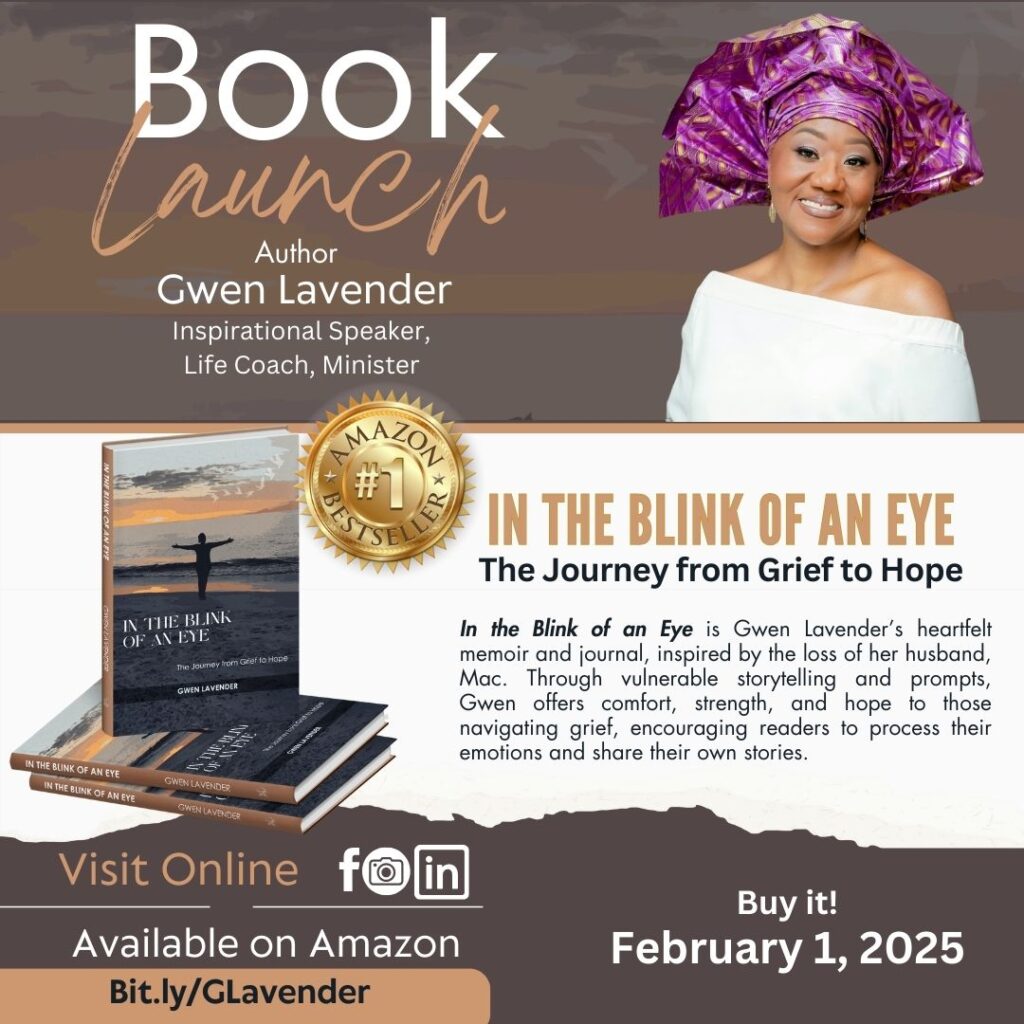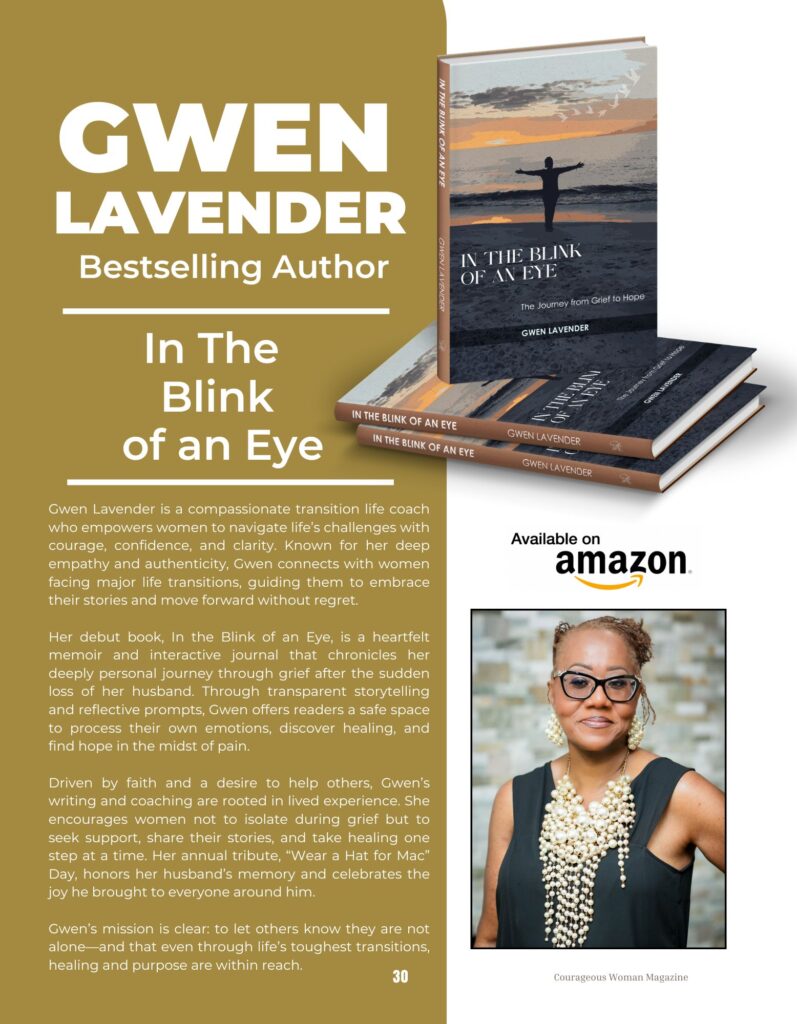
Who Is Gwen Lavender?
Gwen Lavender is a compassionate Transition Life Coach devoted to helping women navigate lifeŌĆÖs unexpected turns with courage, confidence, and clarity. With an innate ability to connect with those facing hardship, Gwen draws from her own journey of love, loss, and healing to guide others toward purpose and peace. She believes every woman has a story worth owning and tellingŌĆöand she has made it her mission to support women as they move forward, not with regret, but with renewed direction. GwenŌĆÖs personal experience with grief led her to write In the Blink of an Eye, a memoir and interactive journal that offers both transparency and transformation. In the following Q&A, Gwen shares the inspiration behind her book, her personal healing journey, and her message of hope for those navigating the pain of loss.
What is the premise of your book, In the Blink of an Eye?
In the Blink of an Eye is a transparent memoir and interactive journal. Within this book, I have shared intimate and vulnerable moments of my personal story, alongside writing prompts that encourage you to reflect and process your own emotions and experiences. Sharing my story has been instrumental in my healing process. This book is dedicated to those enduring the loss of a loved one and doing their best.
What inspired you to write In the Blink of an Eye and share such a deeply personal journey of grief and healing with the world?
It’s always been in my heart to write a book. It wasn’t this particular story, but a story. My friend Donna gave me a journal after the death of my husband. I wanted to remember what I went through. I started to put things downŌĆömy thoughts in the momentŌĆöbecause it was so painful, I felt like it would help somebody else. No one had shared this with me before. I wanted people to know what a real-life experience of grieving was like. Even though everybody’s journey is different, there might be snippets of my experience that would help them through theirs. The book was necessary, and it was part of the healing process to get me where I am today. I had to speak it, to share it, in order to heal.
Grief can often be isolating. How did sharing your story help you connect with others who experienced similar losses?
It can definitely be isolatingŌĆöand it was isolating. I look at connections in two ways: those that came into my life and those I sought out. Initially, others entered my life and shared their stories with me. Later, I met people who I was a few steps ahead of me, and I was able to support them. Participating in the GriefShare program was crucial for me. We gathered as individuals with unique grief journeys, spoke, and listened. ItŌĆÖs isolating, but you have to take that step to connect with others.
You included interactive journaling prompts throughout the book. What role did journaling play in your own healing journey, and why did you decide to incorporate it for readers?
Journaling was essential for me. In the beginning, I just took notes to remember everything. When a friend gave me a beautiful journal, I started capturing things daily. It helped me unload my thoughts. Writing made things less overwhelming. I wanted to give readers a similar space to reflect.
Were there moments when writing the book became emotionally overwhelming? How did you push through those difficult times?
Yes, absolutely. It was like re-living the entire event, especially walking through that Sunday morning. I had to put it aside and come back to it later. Chapters 4 and 5 were especially hardŌĆöthey detail the day of my husbandŌĆÖs heart attack and the moment we decided to take him off life support. Chapter 6 talks about the difficult nights. I made it through with faith and the promises of God. A friend told me to take it one step at a time, and thatŌĆÖs what I did.
What lessons about strength, resilience, and faith did you learn through this painful experience that you hope readers will take away from your book?
Faith is key! Know that you’re going to get through it, as long as you keep going.
Your memoir is both a story of loss and a testament to healing. What message of hope do you want to leave with readers facing their darkest moments of grief?
Don’t isolate yourself. ItŌĆÖs hard to carry the weight alone. There are grief communities out thereŌĆöGriefShare or othersŌĆöand you might find support in the most unexpected places. In Chapter 8, I talk about the support that found me. But you have to take the step to accept it. IŌĆÖve seen people stay stuck, but if thereŌĆÖs a desire to heal, you can move forward. You donŌĆÖt have to move on, but you can move forward.
How has your understanding of love and life evolved through this journey? Are there ways you now see life differently?
It helped me see myself. I could take the steps I needed without staying in sorrow. I began to see options, purpose, and growth. Writing this book helped shape me into who I truly want to be. I became my most authentic selfŌĆöand I fully embrace who I have become.
In what ways has MacŌĆÖs memory continued to guide and inspire you as you move forward?
Not a day passes without hearing PeeweeŌĆÖs voice echo in my heart. His words bring warmth and unexpected smiles. The annual “Wear a Hat for Mac” Day has become a cherished tradition. Peewee had a collection of hats he loved to wear, and now friends and family choose one from his collection to wear in his honor. The hats are a joyful reminder of his spiritŌĆöhis humor, wisdom, and love. We laugh, share stories, and celebrate the essence of who he wasŌĆöMac, Peewee, Dad, Pops, Pawpaw.
What advice would you give to women who may be at the beginning of their grief journey and struggling to find the strength to keep going?
Embrace where you are in the process. DonŌĆÖt let anyone tell you how to grieve. Take it one step at a time. Also, find people who have been through similar experiencesŌĆöthey can help you see what you might not see on your own. And if you donŌĆÖt have anyone else to talk to, reach out to me.
Gwen LavenderŌĆÖs heartfelt story reminds us that grief, while painful and deeply personal, does not have to be endured alone. Through vulnerability, faith, and connection, healing becomes possible. In the Blink of an Eye is more than a memoirŌĆöit is a message of hope, resilience, and restoration. GwenŌĆÖs journey is a testament that even in the most difficult moments, we can discover clarity, courage, and a new sense of purpose. Her story offers every grieving heart a gentle reminder: you can heal, you can grow, and you can move forwardŌĆöone step at a time.
Connect with Gwen Lavender
¤īÉ Website: www.gwenlavender.com
¤ō¦ Email: contact@gwenlavender.com

Join the thriving community of Courageous Woman Magazine. We have been dedicated to empowering women in business for over 14 years. Don’t hesitate to step into the spotlight! Courageous Woman Magazine is here to illuminate and showcase your brand, products, and services, helping you reach a wider audience!

